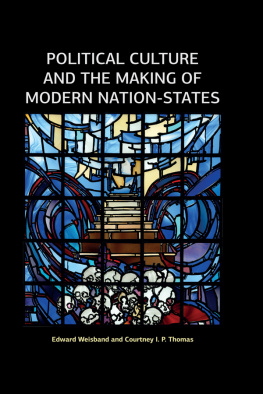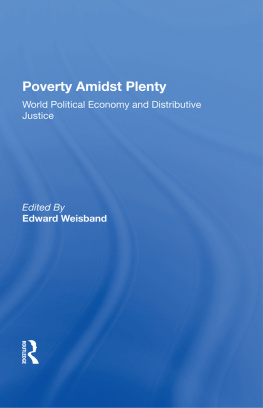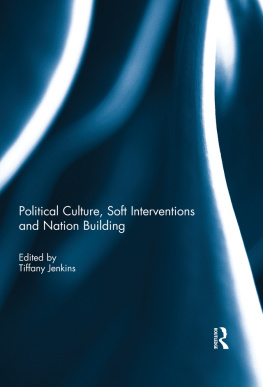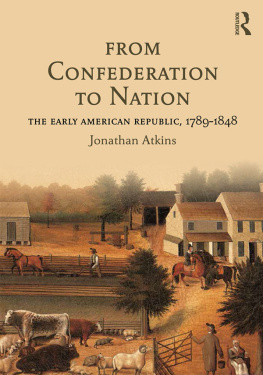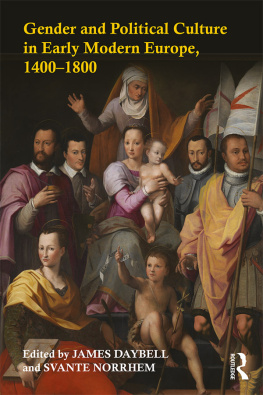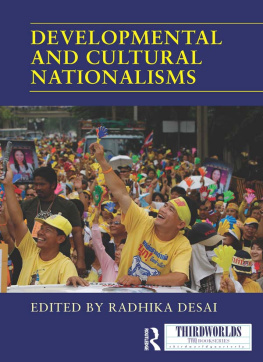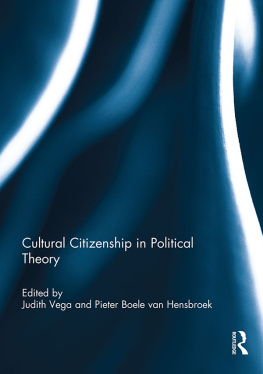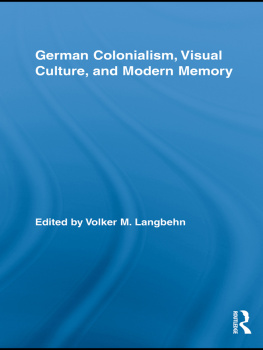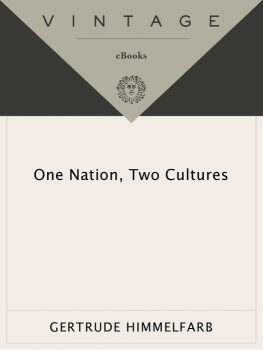POLITICAL CULTURE AND THE MAKING OF MODERN NATION-STATES
First published 2015 by Paradigm Publishers
Published 2016 by Routledge
2 Park Square, Milton Park, Abingdon, Oxon OX14 4RN
711 Third Avenue, New York, NY 10017, USA
Routledge is an imprint of the Taylor & Francis Group, an informa business
Copyright 2015, Taylor & Francis.
All rights reserved. No part of this book may be reprinted or reproduced or utilised in any form or by any electronic, mechanical, or other means, now known or hereafter invented, including photocopying and recording, or in any information storage or retrieval system, without permission in writing from the publishers.
Notice:
Product or corporate names may be trademarks or registered trademarks, and are used only for identification and explanation without intent to infringe.
Library of Congress Cataloging-in-Publication Data
Weisband, Edward, 1939
Political culture and the making of modern nation-states / Edward Weisband and
Courtney I. P. Thomas.
pages cm
Includes bibliographical references and index.
ISBN 978-1-61205-783-5 (hardcover : alk. paper)
ISBN 978-1-61205-802-3 (library ebook)
1. Political culture. 2. Nation-state. I. Thomas, Courtney Irene Powell,
author. II. Title.
JA75.7.W42 2014
320.9dc23
2014021343
ISBN 13: 978-1-61205-783-5 (hbk)
ISBN 13: 978-1-61205-784-2 (pbk)
This book is dedicated to Jennifer Renee Pluta, Evangeline Pluta, Genevieve Pluta, Daniel P. Neville, Morgan Elizabeth Snover, Lane Page Snover, Kayla Renee Snover, Alex Vincent Davie
And to Sonya, Marie, Bettie, and Levi
In hopes that they and succeeding generations live in a world of political cultures where peace, understanding, and reconciliation become so embedded they can be taken for granted.
CONTENTS
We wish to thank the several generations of students who enrolled in Nations and Nationalities: Cultural Constructions of Collective Identity offered by the Department of Political Science and by International Studies at Virginia Tech since the course was first offered in 1995. They have been a joy to teach and their enthusiasm for the study of political cultures represents the inspiration for this book. The recent chairs of the Virginia Tech Department of Political Science have demonstrated a deep commitment to the multidisciplinary educational objectives and innovative instructional approaches essential to the study of political cultures. Thus we want to thank Timothy W. Luke, University Distinguished Professor and current Chair of the Department of Political Science, and Ilja Luciak, Professor and former Chair of the Department of Political Science. Distinguished scholars and excellent teachers each in their own right, they have remained on the front lines of support in assigning graduate teaching assistants in sufficient numbers to permit students enrolled in Nations and Nationalities the opportunity to think critically through essay writing assignments. We wish to recognize all our excellent colleagues in the Virginia Tech Department of Political Science for their dedication to research, teaching, and learning. Yannis Stivachtis, Director of the Virginia Tech International Studies Program, in addition to scholarly contributions on normative and strategic studies, has lent critical support to curricular development of international studies and efforts to introduce students to comparative political cultures. In the context of political culture we want to pay tribute to our Virginia Tech colleagues, Scott G. Nelson for his distinguished scholarship on the concept of sovereignty, Bettina Koch for her outstanding scholarly contributions on medieval Islamic and Christian doctrines of war and their relevance to conflict today, and Wayne D. Moore for his excellent scholarship on American constitutionalism in the making of the United States as a modern nation-state. Several generations of graduate assistants have helped develop the perspectives presented here. We are grateful to all of them. In particular, we want to mention with gratitude Elana Delozier for her wonderful insights and encouragement over many years. We also thank Alec Clott for his contributions to the Alternate Perspectives boxes. We would be remiss not to thank our spouses, Joan Elizabeth (a.k.a. Lisabeth) Weisband and Christopher Thomas, for their understanding and support during the many years while this project took form and matured. Finally, we want to thank Jennifer Knerr and her associates at Paradigm Publishers for their openness to the study of cultural constructions of collective identity and for their willingness to publish this multidisciplinary exercise focused on political culture and identity politics framed in contexts from the communal past to the national present.
This book tells the story of the emergence of nation-states from the perspective of political culture. It does so by examining the historical transformations in political culture etched by the dynamics of nation-building and state-building. Nation-states represent a near-universal political formation in modern times. The development of national languages, the emergence of national traditions, and the anchoring of belief or ideological systems in national political culture coincided with economic and technological developments involving the leap from traditional communities confronted by scarcities to mass populations sustained by agricultural surpluses. Agricultural development fostered the rise of societies of strangers particularly in European and British settlements along the peripheries of the Roman Empire. Such societies required forms of governance that gradually became centralized and increasingly extractive. As this occurred they also demanded blood and treasure in the name of these newly established centralized authorities. These processes first became associated with aristocracy and the dynastic kingdoms of classical royalty, but in the course of both time and revolution they fostered the emergence of sovereign nation-states. This book traces these developments in order to demonstrate how political cultures adjusted to these new realities and in turn how cultural dynamics shaped the forms that sovereign state governance eventually assumed in various national locations throughout the world.
In particular, we examine how and with what consequences cultural forms of national self-consciousness arose. Gradual transformations in political affiliations occurred in ways that illustrate how the shifting sands of political governance depended on the changing nature of political cultures. This book traces these pathways. This exploration reveals how cultural constructions of collective identity created the legitimacies attached to sovereign nation-states as forms of centralized governance. The relationship of nationhood to the legitimacy of centralized state institutions was and continues to be tested. This book demonstrates the significance of political culture for an understanding of the modern world rent by divisions within, beyond, and beneath the nation-state as a political formation. Legitimacy crises, civil strife and insurrections, subnational conflicts, ethno-political violence, and nationalist struggle help to define contemporary international relations and politics. We ask how and why from the perspective of political culture. To understand failed or fragile states, for example, requires exploration of the deep divides of political culture that embed the power dynamics of such conflicts. Much political violence is driven by cultural values and meanings, and in particular by conflicts over identity constructions in political culture as they relate to the nation-state and the legitimacy of its governance. Strategic analysis oriented to power structures and dynamics demands prior understanding of the cultural dimensions of political conflict. Such understanding depends on conceptual clarity regarding a range of terms that are too often loosely applied or used with contradictory meanings. Such terms include state sovereignty; nation and nationhood; nationality, citizenship, and peoplehood; nationalism and patriotism; legitimacy and popular consent; and ethnicity and self-determination.

